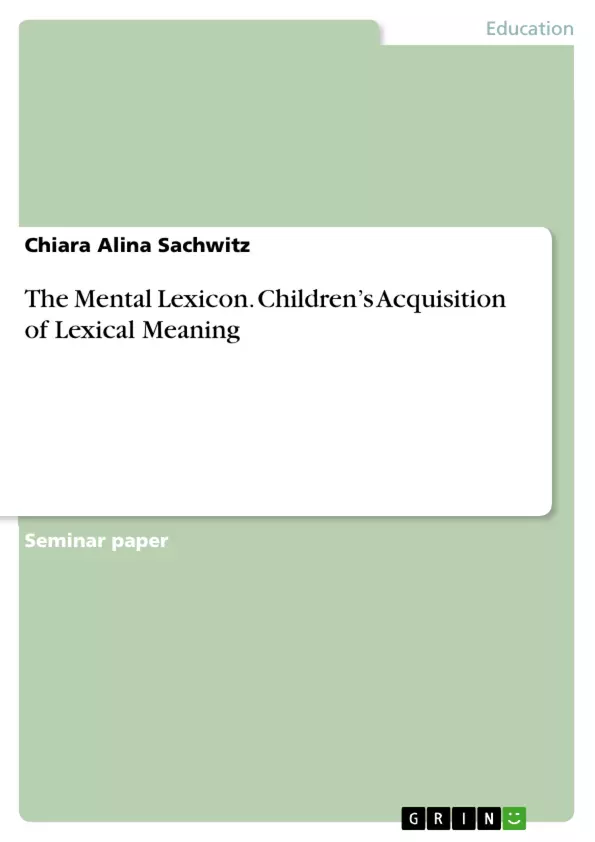In order to understand how children acquire lexical meaning, this term paper focuses on the development of children’s mental lexicon and how children manage to store words in their mind.
Everyday conversation requires most people to use several thousands of words in the course of an average day, while most of the time, people appear having relatively little difficulty in bringing the corresponding terms to their minds. Yet, speakers of a language are mostly unaware of the complex system allowing them to cope with these words and to use them appropriately. When learning a new language, however, adults are likely to reconsider their view on the human word-store, especially, when observing a three-year-old child using a for them difficult-to-learn language effortlessly. How is it possible that children acquire lexical meaning of thousands of words even before they are able to dress themselves properly? When thinking about the question, one might assume the learning of meaning of words as a simple task, imagining a word learning situation where the child is looking at a storybook while one of the parents is naming the depicted object by its respective name.
Inhaltsverzeichnis (Table of Contents)
- Introduction
- The Mental Lexicon
- Defining the Term Mental Lexicon
- The Organization of Information
- The Acquisition of Meaning
- How Children Acquire Meaning
- The Development of Children's Mental Representations
- Conclusion
Zielsetzung und Themenschwerpunkte (Objectives and Key Themes)
This term paper focuses on the development of children's mental lexicon and how children manage to store words in their mind. The paper aims to examine the acquisition of word meaning by children, including the process of linking linguistic units with their meanings. The study aims to understand how children develop a semantic system from first words to the complex adult system.
- Defining the mental lexicon and its organization
- Exploring the acquisition of word meaning by children
- Analyzing the development of children's mental representations
- Investigating how children develop a complex semantic system
Zusammenfassung der Kapitel (Chapter Summaries)
The introduction sets the stage by discussing the complexity of language acquisition, particularly the challenge of linking verbal sounds with their correct meanings. It highlights the apparent ease with which children acquire vocabulary, contrasting it with the difficulties adults face when learning new languages.
Chapter 2 delves into the concept of the mental lexicon, defining it as an organized and active storage system for meaningful linguistic expressions. The chapter examines the organization of information within the mental lexicon, drawing comparisons to the structure of dictionaries. It explores various models of network organization, highlighting the "Spreading Activation Model of Semantic Memory" as an example.
Chapter 3 focuses on the acquisition of word meaning by children. It presents two different perspectives on children's acquisition of terms, exploring the assumption that children learn to associate words with their referents. The chapter investigates the processes involved in acquiring meaning and the development of children's mental representations, including the different levels of use and understanding children experience when learning new words.
Schlüsselwörter (Keywords)
This term paper examines the mental lexicon, a crucial element of language acquisition. Key concepts include the acquisition of word meaning, the development of children's mental representations, and the organization of information in the mental lexicon. The paper explores different perspectives on language acquisition and delves into the process of linking words with their meanings, highlighting the complexity of this task for young learners.
Frequently Asked Questions
What is the "Mental Lexicon"?
The mental lexicon is an organized and active storage system in the human mind for meaningful linguistic expressions, functioning similarly to a complex internal dictionary.
How do children acquire the meaning of words so quickly?
Children manage to link linguistic units with their meanings through a complex semantic system that develops rapidly even before they master basic daily tasks like dressing themselves.
What is the "Spreading Activation Model"?
It is a model used to explain how information is organized in the mental lexicon, suggesting that related concepts are linked in a network where activating one word triggers related terms.
Do children learn words simply by looking at pictures?
While naming objects in storybooks is a common assumption, the paper explores more complex perspectives on how children associate verbal sounds with specific referents and meanings.
What is the difference between adult and child word-stores?
Adults often struggle with new languages, whereas children develop a complex semantic system effortlessly, showing that the acquisition process in early childhood is uniquely efficient.
- Quote paper
- Chiara Alina Sachwitz (Author), 2019, The Mental Lexicon. Children’s Acquisition of Lexical Meaning, Munich, GRIN Verlag, https://www.grin.com/document/1132633



